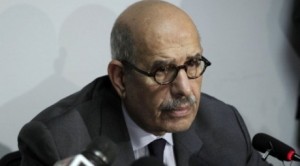
Mohamed ElBaradei spoke to reporters in São Paulo, Brazil on Monday, on the political situation and democratic transition in Egypt.
The leader of Al-Dostour Party reiterated his view that the current Constituent Assembly is not reflective of important segments of the Egyptian population, including women, the youth, and Christians.
“There are very uncomfortable things [in the constitution draft],” said ElBaradei, in the Arab-Brazilian Chamber of Commerce. “The constitution is the basic law; it is something which cannot compromise human freedom, dignity, and equality.”
He said different interpretations of Islamic Shari’a law were the reason for dispute over the draft constitution. “Equality and justice are the cornerstones of Islam. There are many different takes on the Shari’a, and hence the clashes of opinions.”
He highlighted the inability of the current government to deliver on Egyptians’ urgent needs. “We need to tend to healthcare, education, and infrastructure. Unfortunately, the transition was terrible [and] totally confused. We still haven’t harvested the fruits of the revolution, such as employment.”
Baradei warned the Egypt’s transition would be slow and has created frustration among people seeking increased political participation and jobs. He claimed however, that people have already moved away from the culture of fear that had previously plagued the country.
“We still have much work to do to ensure that we are on the right track,” said El Baradei. “What happens in Egypt will have an impact on the Arab World.”
He said he would not run in Egypt’s next presidential elections, claiming his purpose was better served working on the “outside,” and that such plans should be pursued by the country’s younger generation.
The Egyptian Nobel laureate also discussed Syria, stressing real diplomatic steps were needed to solve the situation, simply condemning the violence was not enough.
The former International Atomic Energy Agency (IAEA) secretary-general, downplayed rising tensions between the United States and Israel, and Iran, saying a war would be the last resort for both sides. He said both sides had to enter constructive dialogue, as sanctions alone would not solve the current impasse.
ElBaradei is visiting Brazil to speak at the Frontiers of Thought conference, a cycle of cultural events organised and hosted by a group of high profile Brazilian professionals, in which political thinkers and leaders from all over the world come to give lectures. ElBaradei was scheduled to speak in São Paulo and Port Alegre about the political situation in Arab countries, and possible nuclear threats posed by countries such as Iran and North Korea.


